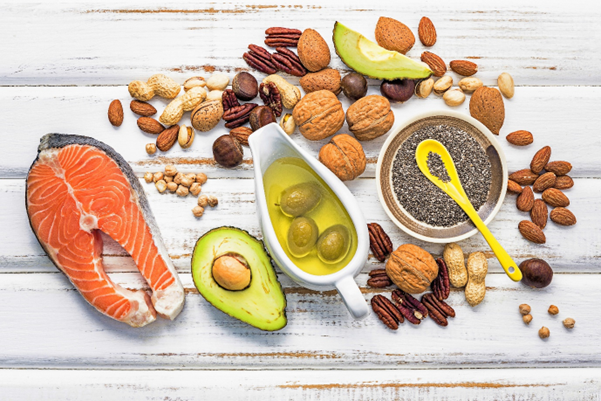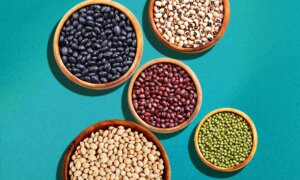Sugar, salt, and high fat are often considered health taboos. However, avoiding them completely can cause harm to the body, leading to decreased sex hormones and affecting the development of reproductive organs.
Zhang Weijun, a nutritionist at Taiwan’s Keyi Nutrition Consulting Center, noted possible harms of lipid deficiency and provided ways to choose good fats.
Dangers of Insufficient Fat Intake
Low-fat diets are fashionable. Excessive fat intake is considered one cause of obesity, along with a series of metabolism-related diseases. However, fat can provide energy for the body, protect internal organs, maintain body temperature, and is an important ingredient in various metabolic activities. Zhang said that not eating enough fat can bring harm to our health, resulting in the following symptoms:
1. Reduction of Sex Hormones. Fat is the precursor for the synthesis of sex hormones. In sufficient fat intake may lead to a reduction in the body’s synthetic hormones, which in turn, affects the development and maturity of the reproductive organs. Women may experience amenorrhea, and men may experience hypogonadism.
2. Fat-Soluble Vitamin Deficiency. Fat-soluble vitamins such as A, D, E, and K need to be combined with fat in food to be digested and absorbed by the body. Insufficient fat intake may lead to various vitamin deficiencies. With lack of vitamin A, the skin appears coarse and rough. Vitamin D is linked to mood and depression, and related to diabetes and cancer. Vitamin E has enormous antioxidant effects and is essential for maintaining a healthy immune system. Lack of vitamin K impedes blood clotting, essential for stopping bleeding by injury.
3. Affects Intestinal Health. Fats lubricate the intestinal tract for gastrointestinal motility and bowel movement. With diets too low in fats, the intestinal tract may suffer constipation due to lack of lubrication.
4. Loss of protection of internal organs. Visceral fat accumulated around internal organs in the abdominal cavity can support, fix, and protect internal organs. A complete lack of visceral fat leaves organs exposed and vulnerable to damage. On the other hand, too much visceral fat can lead to higher cholesterol, blood sugar levels, and blood pressure, increasing the risk of Type 2 diabetes, breast cancer, and heart disease, so balance is key.
5. Affects body temperature regulation. Fat insulates and retains heat and plays a significant role in maintaining body temperature.
Fat Intake Regime
Insufficient fat intake isn’t a problem for most people. More harmful is the excessive intake of low-quality fat, which is damaging to health. Zhang suggested we follow the “369 principle” to choose a reliable source of oil for ourselves.When we say reliable sources, we mean monounsaturated fatty acids and polyunsaturated fatty acids, he said. Monounsaturated fatty acids can lower LDL (bad) cholesterol and help keep blood vessels open. Polyunsaturated fatty acids help dilute blood concentration, lower blood pressure, and improve immune system functionalities. These are omega-3, omega-6, and omega-9.
Omega-3 and -6 are polyunsaturated fatty acids that the body cannot synthesize by itself. Omega-9 is a monounsaturated fatty acid that the body can make.
Omega-3 has anti-inflammatory effects and is commonly found in fish oil and sacha inchi oil. Fish such as mackerel, salmon, and saury are good choices for supplementing omega-3. The American Heart Association recommends that adults eat fish twice a week, with each serving about the size of a palm, to fully supplement omega-3. However, pregnant women and children should reduce their consumption of fish with high mercury levels, such as shark, swordfish, bigeye, and tuna.
Omega-6 is commonly found in sunflower oil, corn oil, soybean oil, and peanut oil. Zhang said that excessive intake of omega-6 may cause inflammation in the body, and it is recommended to take omega-9 as a replacement for Omega-6.
Omega-9 is not involved in inflammatory reactions and can be obtained from avocado, olive, camellia, and canola oils. These oils are also rich in polyphenols and have good antioxidant effects, helping to enhance physical health.
So-called “bad” fats include saturated fats and trans fats. Animal fats such as beef tallow and lard and certain vegetable oils such as coconut and palm oil contain considerable amounts of saturated fat. In the past few years, coconut oil has attracted much attention because it was promoted as a healthy oil to prevent dementia, but Zhang suggested that it is better not to eat it.
Trans fat is bad oil produced after high-temperature processing of good oil. It is commonly found in fried foods such as fried and battered foods, soufflé, butter, and potato chips. Ingesting too much trans fat will increase the risk of cardiovascular disease and diabetes, so we should try our best to avoid it.
Zhang pointed out that even homemade grilled and fried foods will increase the content of trans fat. In addition, protein ingredients contain fat to a certain extent, so the amount of oil used during cooking should be well controlled. In this respect, one to two small teaspoonfuls of oil should be optimal for each meal. Or a “water frying” method can be used. That is, after cooking the food with water, add a little oil before putting it in the pot. This can reduce the fat intake and reduce the impact on health from the smoke generated.
Need to Take Oil?
A light diet generally refers to eating foods that are easy to digest, low in fat, and minimally processed. The focus is on simplicity and avoiding rich, heavy, or greasy meals. This type of diet often includes fruits, vegetables, lean proteins, and whole grains. A light diet is traditionally recommended for better digestion, weight control, and overall health.
Taking oil on an empty stomach is a new trend that challenges the traditional preference for light diets. The practice involves taking a small amount of healthy oil, such as olive or camellia, first thing in the morning before eating anything else. Zhang highlights three key benefits of taking oil on an empty stomach:
- Feel Fuller, Eat Less
Oils rich in monounsaturated fats, like olive or camellia, can help you feel fuller longer. This reduces cravings for carbs and helps balance your diet. Since fat is one of the body’s three main nutrients—along with protein and carbs—increasing your healthy fat intake naturally lowers the need for other nutrients.
- Gentle on the Gut
A small amount of oil in the morning acts as a natural lubricant for your digestive system, promoting smoother bowel movements and giving a sense of detoxification.
- Boost Your Body’s Defenses
High-quality oils are packed with polyphenols, powerful antioxidants that help protect your cells from damage and support overall health.
Pro Tip: Snack on Nuts for Healthy Fats
Zhang also recommends eating a small amount of nuts daily. Nuts are a fantastic source of monounsaturated and polyunsaturated fats and are loaded with polyphenols, vitamins, and minerals. They promote heart health and further enhance your body’s antioxidant power.
Incorporating these simple habits can nourish your body and support long-term well-being!














